When diving into the world of gear DC motors, one of the first questions that often pops up is: “How much does a gear DC motor cost?” It’s a simple question with a surprisingly complex set of answers. The truth is, the price of a gear DC motor isn't set in stone; it dances to the tune of several factors, each playing a critical role in determining the final cost. Whether you're an engineer designing a robotic arm, a hobbyist building a custom drone, or an industrial buyer sourcing components for manufacturing, understanding what influences gear motor prices can significantly impact your budget and project success.

What Is a Gear DC Motor?
Before untangling the web of pricing, let's briefly define what a gear DC motor is. At its core, it's a combination of a traditional direct current (DC) motor with a gear mechanism attached. This gear assembly reduces the motor’s speed while increasing its torque—a vital function in many applications like robotics, automation, electric vehicles, and machinery.
The gear component can be a simple gear train or a planetary gear system, each with different performance characteristics and costs. This integration allows for more precise control over movement and force, enabling devices to operate more efficiently, even under demanding conditions.
Factors Influencing Gear DC Motor Prices
So if you're pondering the cost, what should you be looking at? Here are the key elements that influence the price of gear DC motors:
1. Motor Power and Voltage
The power rating (measured in watts or horsepower) and voltage of a motor are primary cost factors. High-torque motors with higher voltage ratings tend to be more expensive due to increased materials, complexity, and manufacturing precision. For instance, a 12V small DC gear motor suitable for toys or hobby projects is dramatically less costly than a 48V industrial-grade gear motor designed for heavy machinery.
2. Gear Ratio and Type
The gear ratio, which is the ratio between input and output speed, can significantly impact the price. High gear ratios usually mean more complex gear trains or specialized materials, leading to higher costs. Additionally, the type of gear system—spur gears, planetary gears, worm gears—affects not just performance but also the price. Planetary gear systems are generally more efficient and durable but come at a premium compared to simpler spur gear setups.
3. Build Quality and Materials
Quality matters a lot. Metal gears (like brass or steel) tend to be more durable and command higher prices than plastic gears. If your application involves heavy loads or continuous operation, investing in high-quality gear materials pays off in longevity, but it also raises the cost.
4. Size and Form Factor
Size isn’t just about fitting into your device; it also influences cost. Smaller motors with compact design tend to be cheaper, but if you need a motor that fits into tight spaces while delivering high power, expect to pay more for precision manufacturing and intricate design.
5. Brand and Origin
Brand reputation counts. Well-established manufacturers with reliable quality control and warranty support tend to charge a premium, but you also gain peace of mind. Conversely, generic or lesser-known brands might offer cheaper alternatives but with potential trade-offs in durability and performance.
6. Additional Features and Customization
Some gear DC motors come with features like waterproof coatings, encoder integration for feedback, or custom shafts. These tailored features push the price upward but could be crucial depending on your application's requirements.
The Price Spectrum
Now, getting down to specifics—what’s the typical price range? Here’s a rough outline:
Low-cost hobby-grade gear motors: $10 to $50 Ideal for small project enthusiasts or educational kits, these motors are usually from Asian manufacturers, made with plastic gears and modest power ratings.
Mid-range industrial-grade motors: $50 to $200 These are more durable, with metal gear sets, higher torque, and better heat dissipation, suitable for robotics, automation, and commercially available equipment.
High-end specialized motors: $200 to upwards of $1,000+ For custom-built, high-power applications, or motors with premium features such as encoders, sealed housings, or exotic materials, prices can climb into four figures.
Where to Find Competitive Prices?
You might wonder where to shop for these motors without breaking the bank. E-commerce giants like Alibaba, Amazon, and specialized industrial suppliers are good starting points. Always compare specifications and reviews—price shouldn’t be the only factor. Sometimes investing a little more upfront saves money in the long run through better reliability and performance.
Would you like to explore how to select the best gear DC motor based on your application, or shall we get into how to negotiate prices with suppliers?
Leveraging innovations in modular drive technology, Kpower integrates high-performance motors, precision reducers, and multi-protocol control systems to provide efficient and customized smart drive system solutions.




































